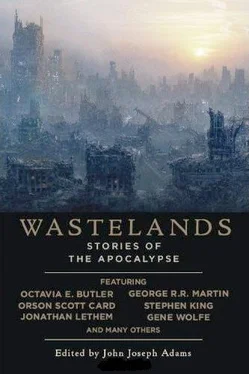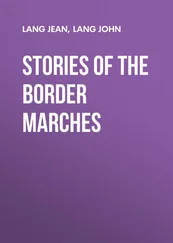There is a moment of electric silence. Eyes shift: gray, blue, brown. Even before Rachel rises from her stool or McHabe says, "We think the best chances to avoid scarring are with young people without heavy skin manifestations," I know. Rachel puts her arms around me. And Jennie-Jennie with the red ribbon woven in her hair, sitting on her broken chair as on a throne, Jennie who never heard of neurotransmitters or slow viruses or risk calculations-says simply, "It has to be me," and looks at McHabe with eyes shining with love.
#
I say no. I send McHabe away and say no. I reason with both girls and say no. They look unhappily at each other, and I wonder how long it will be before they realize they can act without permission, without obedience. But they never have.
We argue for nearly an hour, and then I insist they go on to the dance, and that I go with them. The night is cold. Jennie puts on her sweater, a heavy hand-knitted garment that covers her shapelessly from neck to knees. Rachel drags on her coat, a black donated synthetic frayed at cuffs and hem. As we go out the door, she stops me with a hand on my arm.
"Gram—why did you say no?"
"Why? Honey, I’ve been telling you for an hour. The risk, the danger.
"Is it that? Or—" I can feel her in the darkness of the hall, gathering herself together "—or is it—don’t be mad, Gram, please don’t be mad at me—is it because the cure is a new thing, a change? A… different thing you don’t want because it’s exciting? Like Tom said?"
"No, it isn’t that," I say, and feel her tense beside me, and for the first time in her life I don’t know what the tensing means.
We go down the street towards Block B. There’s a moon and stars, tiny high pinpoints of cold light. Block B is further lit by kerosene lamps and by torches stuck in the ground in front of the peeling barracks walls that form the cheerless square. Or does it only seem cheerless because of what McHabe said? Could we have done better than this blank utilitarianism, this subdued bleakness-this peace? Before tonight, I wouldn’t have asked.
I stand in the darkness at the head of the street, just beyond the square, with Rachel and Jennie. The band plays across from me, a violin, guitar, and trumpet with one valve that keeps sticking. People bundled in all the clothes they own ring the square, clustering in the circles of light around the torches, talking in quiet voices. Six or seven couples dance slowly in the middle of the barren earth, holding each other loosely and shuffling to a plaintive version of "Starships and Roses." The song was a hit the year I got the disease, and then had a revival a decade later, the year the first manned expedition left for Mars. The expedition was supposed to set up a colony.
Are they still there?
We had written no new songs.
Peter and Mamie circle among the other couples. "Starships and Roses" ends and the band begins "Yesterday." A turn brings Mamie’s face briefly into full torchlight: it’s clenched and tight, streaked with tears.
"You should sit down, Gram," Rachel says. This is the first time she’s spoken to me since we left the barracks. Her voice is heavy but not angry, and there is no anger in Jennie’s arm as she sets down the three-legged stool she carried for me. Neither of them is ever really angry.
Under my weight the stool sinks unevenly into the ground. A boy, twelve or thirteen years old, comes up to Jennie and wordlessly holds out his hand. They join the dancing couples. Jack Stevenson, much more arthritic than I, hobbles towards me with his grandson Hal by his side.
"Hello, Sarah. Been a long time."
"Hello, Jack." Thick disease ridges cross both his cheeks and snakes down his nose. Once, long ago, we were at Yale together.
"Hal, go dance with Rachel," Jack says. "Give me that stool first." Hal, obedient, exchanges the stool for Rachel, and Jack lowers himself to sit beside me. "Big doings, Sarah."
"So I hear."
"McHabe told you? All of it? He said he’d been to see you just before me."
"He told me."
"What do you think?"
"I don’t know."
"He wants Hal to try the cure."
Hal. I hadn’t thought. The boy’s face is smooth and clear, the only visible skin ridges on his right hand. I say, "Jennie, too."
Jack nods, apparently unsurprised. "Hal said no."
"Hal did?"
"You mean Jennie didn’t?" He stares at me. "She’d even consider something as dangerous as an untried cure-not to mention this alleged passing Outside?" I don’t answer. Peter and Mamie dance from behind the other couples, disappear again. The song they dance to is slow, sad, and old.
"Jack—could we have done better here? With the colony?"
Jack watches the dancers. Finally he says, "We don’t kill each other. We don’t burn things down. We don’t steal, or at least not much and not cripplingly. We don’t hoard. It seems to me we’ve done better than anyone had ever hoped. Including us." His eyes search the dancers for Hal. "He’s the best thing in my life, that boy."
Another rare flash of memory: Jack debating in some long-forgotten political science class at Yale, a young man on fire. He stands braced lightly on the balls of his feet, leaning forward like a fighter or a dancer, the electric lights brilliant on his glossy black hair. Young women watch him with their hands quiet on their open textbooks. He has the pro side of the debating question: Resolved: Fomenting first-strike third-world wars is an effective method of deterring nuclear conflict among superpowers.
Abruptly the band stops playing. In the centre of the square Peter and Mamie shout at each other.
"—saw the way you touched her! You bastard, you faithless prick!"
"For God’s sake, Mamie, not here!"
"Why not here? You didn’t mind dancing with her here, touching her back here, and ass and… and…" She starts to cry. People look away, embarrassed. A woman I don’t know steps forward and puts a hesitant hand on Mamie’s shoulder. Mamie shakes it off, her hands to her face, and rushes away from the square. Peter stands there dumbly a moment before saying to no one in particular, "I’m sorry. Please dance." He walks towards the band who begin, raggedly, to play "Didn’t We Almost Have It All." The song is twenty-five years old. Jack Stevenson says, "Can I help,
Sarah? With your girl?"
"How?"
"I don’t know," he says, and of course he doesn’t. He offers not out of usefulness but out of empathy, knowing how the ugly little scene in the torchlight depresses me. Do we all so easily understand depression?
Rachel dances by with someone I don’t know, a still-faced older man. She throws a worried glance over his shoulder: now Jennie is dancing with Peter. I can’t see Peter’s face. But I see Jennie’s. She looks directly at no one, but then she doesn’t have to. The message she’s sending is clear: I forbade her to come to the dance with McHabe, but I didn’t forbid her to dance with Peter and so she is, even though she doesn’t want to, even though it’s clear from her face that this tiny act of defiance terrifies her. Peter tightens his arm and she jerks backward against it, smiling hard.
Kara Desmond and Rob Cottrell come up to me, blocking my view of the dancers. They’ve been here as long as I. Kara has an infant great-grandchild, one of the rare babies born already disfigured by the disease. Kara’s dress, which she wears over jeans for warmth, is torn at the hem; her voice is soft. "Sarah. It’s great to see you out." Rob says nothing. He’s put on weight in the few years since I saw him last. In the flickering torchlight his jowly face shines with the serenity of a diseased Buddha.
It’s two more dances before I realize that Jennie has disappeared.
I look around for Rachel. She’s pouring sumac tea for the band. Peter dances by with a woman not wearing jeans under her dress; the woman is shivering and smiling. So it isn’t Peter that Jennie left with…
Читать дальше












